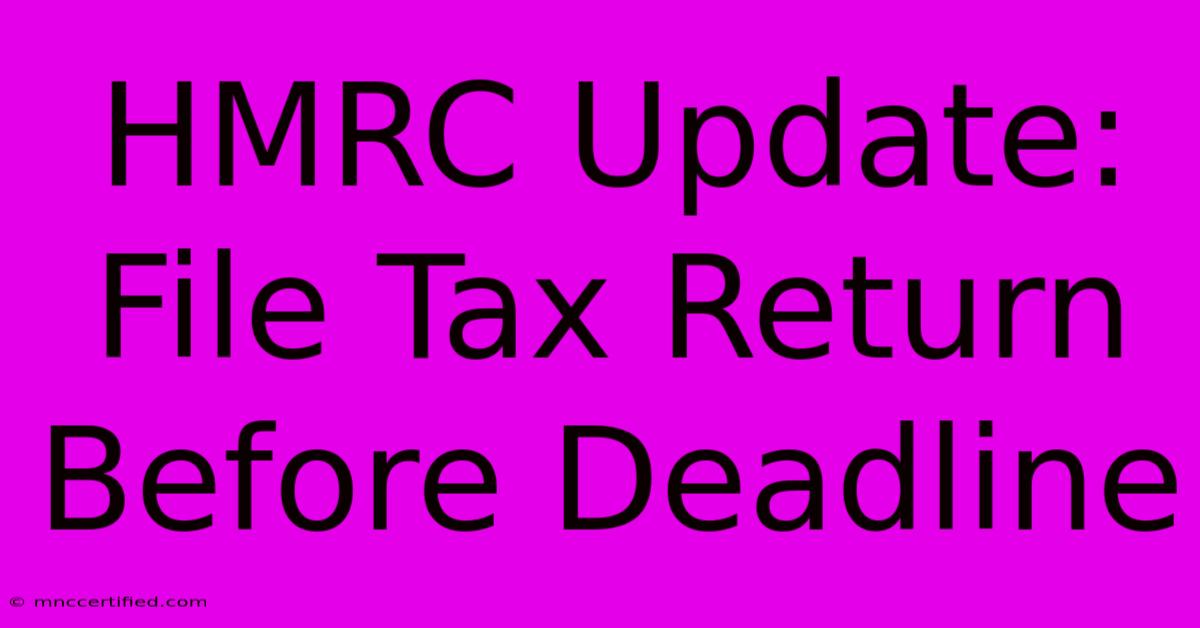HMRC Update: File Tax Return Before Deadline

Table of Contents
HMRC Update: File Your Tax Return Before the Deadline – Avoid Penalties!
The annual tax return deadline looms, and it's crucial to ensure you file your self-assessment tax return with HMRC before the deadline. Missing this deadline can lead to significant penalties, impacting your finances. This comprehensive guide provides essential information to help you navigate the process smoothly and avoid unnecessary stress.
Understanding the HMRC Self-Assessment Deadline
The HMRC self-assessment tax return deadline is typically 31 January following the tax year (6 April to 5 April). This means for the 2022-2023 tax year, the deadline was 31 January 2024. Always double-check the official HMRC website for the most up-to-date information, as deadlines can occasionally change. Don't rely on memory; confirm the exact date to avoid penalties.
Penalties for Late Submission
Late submission of your tax return incurs automatic penalties from HMRC. These penalties are not negligible and can escalate significantly the longer you delay. The penalties usually begin with a late filing penalty, followed by further penalties for outstanding tax payments.
- Late Filing Penalty: A penalty is applied if you file your return after the deadline, even if you owe no tax. This penalty typically starts at £100 and can increase.
- Late Payment Penalty: Separate penalties apply if you owe tax and don't pay it by the deadline. These penalties can also significantly increase over time.
It's far more cost-effective to submit your tax return on time, even if you're expecting a refund. The peace of mind is worth avoiding the potential financial burden of penalties.
How to File Your Tax Return with HMRC
Filing your tax return with HMRC is generally a straightforward process, but it's important to be organised and accurate. Here's a breakdown of the steps involved:
1. Gather Your Information
Before you begin, gather all the necessary documents, including:
- P60s and P45s: These forms summarise your employment income and tax deductions.
- Bank statements: These are essential for tracking income and expenses.
- Self-employment records: If self-employed, keep detailed records of income and expenses. This includes invoices, receipts, and bank statements.
- Rental income details: If you receive rental income, gather all relevant information.
- Tax-deductible expenses: Be sure to gather all relevant documents to support your claims for tax-deductible expenses.
Accurate record-keeping is crucial throughout the year. This will make filing your tax return much easier and less stressful.
2. Access Your HMRC Account Online
You will typically file your tax return through the HMRC online portal. You'll need your Government Gateway user ID and password to log in. If you don't have an account, you'll need to create one.
3. Complete Your Tax Return
The online portal guides you through the process, providing clear instructions for each section. Take your time and ensure accuracy. If you're unsure about any aspect, consult a tax advisor.
4. Review and Submit
Before submitting your tax return, carefully review all the information to ensure its accuracy. Once you're satisfied, submit your return. You'll receive confirmation once your return is successfully processed.
Seeking Professional Help
If you find the self-assessment process overwhelming or complex, consider seeking help from a qualified tax advisor or accountant. They can provide expert guidance and support to ensure you comply with all the relevant regulations and avoid potential penalties. Remember, professional assistance can often save you more money than the cost of their services in the long run.
Keywords for SEO:
- HMRC tax return
- Self-assessment tax return
- HMRC deadline
- Tax return deadline 2024 (or relevant year)
- File tax return online
- HMRC penalties
- Late tax return penalty
- Tax return filing
- Government Gateway
- HMRC online portal
- Tax advisor
- Accountant
- Tax deductible expenses
This article is for informational purposes only and does not constitute professional tax advice. Always consult with a qualified professional for personalized guidance.

Thank you for visiting our website wich cover about HMRC Update: File Tax Return Before Deadline. We hope the information provided has been useful to you. Feel free to contact us if you have any questions or need further assistance. See you next time and dont miss to bookmark.
Featured Posts
-
Who Killed Sara Sharif Update
Dec 12, 2024
-
Fans Frustrated Despite Qpr Win Cifuentes Responds
Dec 12, 2024
-
Man Accused Of Accosting Mace Pleads Not Guilty
Dec 12, 2024
-
40 Years Of Last Christmas Ah And Ridgeley
Dec 12, 2024
-
Road Closed Indefinitely Accident
Dec 12, 2024